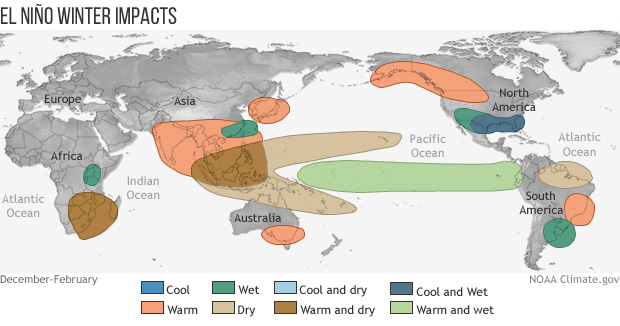Houstonians can expect more rain than usual — and possibly street flooding — this winter, thanks to El Niño.
The National Weather Service forecasts an 80 percent chance for a weak to moderate El Niño this winter, starting around Christmas and lasting through February. In Houston, El Niño means a warmer and wetter winter that could have more severe storms and a higher risk of localized flooding.
Last week’s storm, which brought high winds and street flooding to the region, is indicative of an El Niño storm, said Ken Prochazka, a meteorologist with the National Weather Service in Houston.
“After our wet fall, the ground out there is saturated,” Prochazka said. “When we don’t get a chance to dry out, we’re more likely to have runoff and street flooding.”
El Niño occurs when the temperature of the Pacific Ocean off the coast of South America is warmer than usual. The warm Pacific water affects the atmosphere and causes changes in weather patterns around the world.
In the U.S., El Niño accelerates the North American jet stream, pushing storms from the Pacific across the the country at a faster speed. Storms can move across Texas every three to four days during El Niño, dropping more rain than usual.
Houston typically sees 3.6 inches of rain in January. El Niño can bring more rain than that, Prochazka said.
[…]
Houston last saw El Niño-related storms between 2014 and 2016. The city saw particularly strong El Niño storms in 1997 and 1998. El Niño, which occurs unpredictably, can last for a couple of years, Prochazka said.
It is what it is. All we can do is try to be ready for it.


Climate scientist Daniel Swain points out that there is currently far less of a temperature gradient across the tropical Pacific than is present in a typical El Niño event, and even the North Pacific is showing elevated temperatures. In short, this suggests that resulting weather events and patterns may not follow the norm. Sure, he’s talking specifically about California, but we’re downstream and so perhaps we should be expecting the unexpected. http://weatherwest.com/